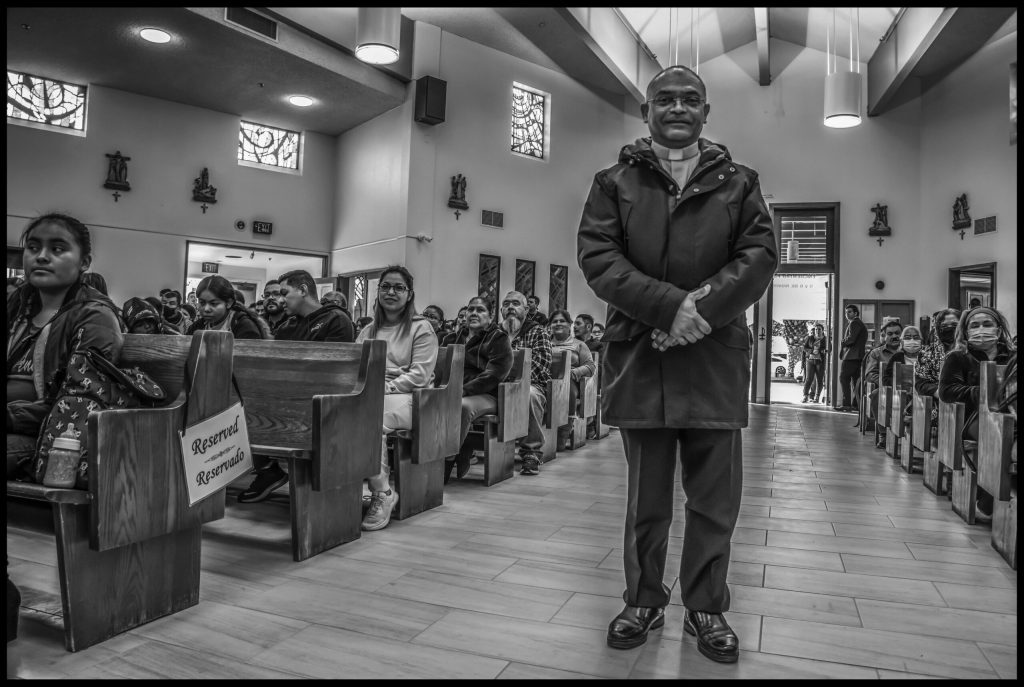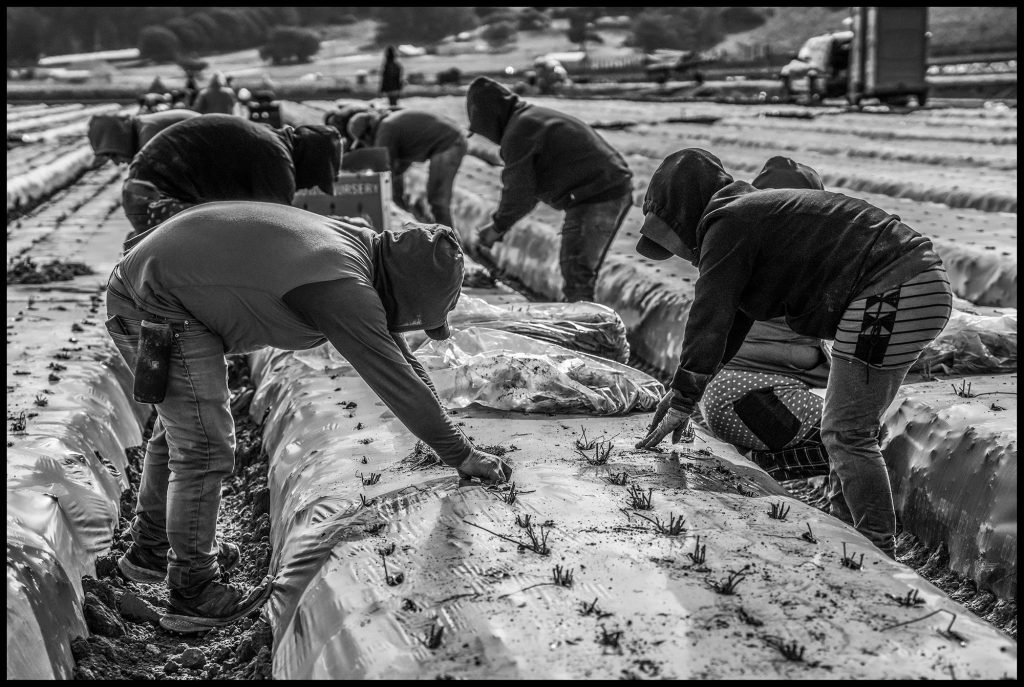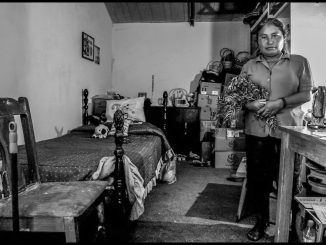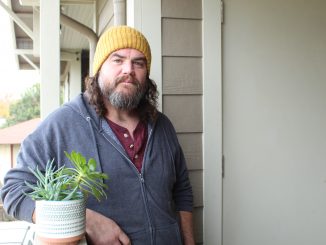
This story is produced by the award-winning journalism nonprofit Capital & Main, as part of its Ill Harvest series, and co-published here with permission.
After interviewing hundreds of farmworkers in three states for a study of the impact of COVID-19 on farmworkers and their families, Bonnie Bade, a medical anthropologist at Cal State University San Marcos, still remembers one case in particular: the suicide of a 14-year-old in the San Joaquin Valley.
“We were doing some interviews, and a family member told us about this case,” said Bade. “She killed herself after her family was diagnosed with COVID.”
The teen’s story is described in phase two of the COVID Farmworker Study (COFS), published in 2021, conducted by a wide group of community based organizations, researchers and policy advocates, and facilitated by the California Institute for Rural Studies. The tragedy wasn’t even in the news.
The story, as told by Maricela, a 49-year-old farmworker (only her first name was cited in the study), was that her brother’s family got sick with COVID: mom, dad and three girls. They were all shut down in the house for a month, “which made the girls very sad and depressed,” the farmworkers said in the report.
When they got better, school started, and the 14-year-old realized she would still take classes online.
“And this girl [the suicide victim] sent my niece a message, both of them were 14. So, she told my niece, ’You know what? I can’t take it anymore. I thought that with getting better, we could leave [the house], but I would prefer to die.’”
The girl hanged herself.
It is a shocking story of the pandemic’s mental health impact on farmworker families, but hardly the only one. Almost every concern expressed by farmworkers for the survey “had a mental health impact,” said Bade.
In the COFS study, the concerns shared by farmworkers about losing income or employment in the case of infection, infecting family members because they live in crowded housing conditions, and lack of access to medical care were all tinged with fear and anxiety.
“Mental health is a big issue among farmworkers, and it got exacerbated during COVID,” she said.
Bade and other researchers work hand in hand with advocates, policymakers and community-based organizations to evaluate how to provide mental health services, an issue that is generally not talked about in mainstream society, let alone in the fields of California.
They are slowly making strides in access to care and understanding the needs of one of the most vulnerable populations in the state and the nation.
COVID makes bad situation worse
The pandemic hit California’s Latino farmworkers hard. During the first year of the pandemic, they experienced among the state’s highest rates of excess mortality. When a lot of other people were isolating at home, farmworkers were among the essential workforce that continued working, often without the vital protection of masks and disinfectants, which in rural areas were hard to come by at the beginning and, in many cases, not provided by employers.
The barriers to care didn’t start with COVID-19. Still, the pandemic made them worse for farmworkers, said Dr. Sergio Aguilar-Gaxiola, professor of clinical internal medicine and founding director of the Center for Reducing Health Disparities at UC Davis.
“Lack of transportation is often a big barrier, and time to seek medical services is another,” said Aguilar-Gaxiola.
“When are the services available? If they are only Monday through Friday from 8 to 5, they won’t use them. They can’t because that would prevent them from earning a full day of salary, and they are living day to day,” added the scholar, who is from Mexico and has researched the health disparities and mental health of farmworkers for decades.
The uncertainty of daily life as a low income farmworker in isolated areas worsened quite a bit with the fear of COVID-19. A study by the UC Berkeley School of Public Health published in the summer of 2020 found that 58 percent of farmworkers who had symptoms associated with COVID-19 and later tested positive had gone to work while feeling sick.

“When COVID started, they didn’t say that employers were obligated to pay sick leave and people could stay home, so people went to work sick, and they would work and infect many others,” said Luis Lopez, a farmworker in Santa Maria, a city in northern Santa Barbara County.
According to Father Rolando Sierra, pastor of St. John Neumann Catholic Church in Santa Maria, the resulting health impacts were not merely physical but mental and spiritual as well.
“It was terrible, it was hard, there were many deaths in the family, and they were significantly affected, but they always kept working,” said Sierra.
“They are very accustomed to this limit between life and death that for us is very alarming,” said the priest. “But they would come to the church, and they wanted us to listen to them; we had to tend to their spiritual health.”
‘They just don’t access services’
Both researchers and advocates have documented worsening mental health impacts among farmworkers during COVID; mental health issues were already severe because of working conditions prior to a spike in uncertainty about the future during the Trump administration, particularly for undocumented farmworkers.
“We recently did a survey and found farmworkers were apprehensive about inflation. They will say: ‘The price of food and gas is going up, and our salaries stay the same,’” said Alondra Santiago, a researcher with the California Institute for Rural Studies.
For years, experts have found elevated depression symptoms among farmworkers. Still, new research found a more significant impact in the last two years: increased substance use and signs of depression and anxiety, particularly after being infected with COVID.
“It wasn’t just the pandemic; you are talking about four years of a terrible administration [threatening arrest and deportation] that put families in survival mode,” said Cristel Jensen, a staff member of the California Institute of Rural Studies. She she said the two presidents before Donald Trump, Barack Obama and George W. Bush, also conducted raids and a high number of deportations.
“Farmworkers weren’t sure if they would show up to work and would be taken away from their families,” she said.
It all adds up over time.
Estela Chamu, a volunteer community health worker (who are also known as promotores) with Vista Community Clinic in North San Diego County, tells of seeing farmworkers looking sad and despondent when she visits the fields and vegetable packing sites.
“They start with stress, and then they get into depression,” she said. “But they don’t talk about it; they walk around sad. In those fields, there are a lot of depressed people and sad people. And often, you don’t dare to ask them how [they] you feel. You try to talk to them, hang with them, chat with them and make them laugh.”
And yet, they rarely access mental health services. According to Aguilar-Gaxiola, research over the years shows that farmworkers are among the populations that seek mental health services the least, even as they often report similar or higher incidences of depression, anxiety and other ailments compared to others.
“They underutilize services; they don’t access care,” said Aguilar-Gaxiola.
Researchers at UC Merced recently shared data from their Farmworker Health Study, which surveyed over 1,100 workers and studied health care access and utilization, among other things.
The results show that only 3% of farmworkers surveyed sought professional help for mental health issues.
Female farmworkers and those between 18 to 45 years of age describe “a higher likelihood of feeling anxious or depressed,” said the study.
“However, nearly half of them did not report being diagnosed by a health care provider, and less than 6% reported [getting] any mental health services,” the study found.
Language and cultural differences add to the pile of reasons to delay or not access care.
“There’s a huge stigma among Latinos in general in seeking help for mental issues,” said Jensen of the California Institute for Rural Studies. She said that Mexican families can sometimes use “not very healthy coping mechanisms like alcohol, like substance abuse, overworking themselves because of not knowing what to do if they don’t work or if they don’t feel productive.”
Esmeralda Garza, program coordinator for community health in Yolo County, says mental health is not seen as a priority for farmworkers.
“There are things like rent, utilities, car insurance that you do need to have, and that causes stress for farmers who don’t have the income to have a longer and healthier life,” said Garza. “Income is related to health.”
Addressing basic needs first
For farmworkers, generally low income earners, stress and anxiety often have to do with their socioeconomic situation, what experts call “social determinants of health.”
This knowledge shapes the efforts to present solutions, apart from medical treatment or therapies, which are not always readily available to these workers.
Deysi Merino, supervisor of the migrant health program at Vista Community Clinic in northern San Diego County, says that her office connects farmworkers, through outreach and trusted messengers, to programs that can improve their mental health.
“For us, that means to start by addressing those issues that influence their mental health, such as their financial situation, food insecurity and housing insecurity,” said Merino.
Promotores and health educators go into farming communities and provide access to services, including medical care, vaccinations and basic needs such as food distribution.
During the pandemic, the clinic offered financial help thanks to donations from foundations, added Nannette Stamm, chief community health officer at Vista Community Clinic.
Merino sees this help as the first step in addressing mental health issues. The clinic also has two health educators who “are the boots on the ground in farmworker areas,” connecting them to services.
Estela Chamu, a promotora at the clinic, said the program brings information tables to areas frequented by farmworkers. It also provides check-ups for skin cancer, teeth cleanings, vaccinations and provisions such as water, bags, sunglasses and long sleeve T-shirts.
“We offer health information, and if necessary, the health care educators sometimes offer transportation for screening and therapy sessions,” said Chamu.

Farmworkers sometimes reject attempts to address mental health issues if the solutions don’t speak to other fundamental problems, said Bade, the Cal State San Marcos professor.
Some years ago, Bade said, she was working with North County Health Services, and a clinic wanted to use a grant to get a van to deliver mental health services. Clinic leaders ran the idea through an advisory board whose membership was Mixtec and Zapotec, the indigenous groups from Mexico most often found among farmworkers in some areas of California.
“They were like: We don’t have water, we don’t have toilets, of course we have mental health issues. That was their first reaction,” said Bade.
Reaching parents through their children
In Stockton, a community-based organization has its own approach to improving mental health: providing education, child care and a wide array of professional therapy services.
Rocio Villafuerte, 38, is the mother of two children and the wife of a farmworker. The family lives in Lodi, a small community in San Joaquin County. She credits the programs at Stockton’s El Concilio Behavioral and Recovery Center with helping the family overcome difficult times during the pandemic.
“I had my baby girl in July 2019; the boy was only 2 years old. When the pandemic hit, my husband, who works in the fields, was the only one that would go out. I really felt like I was falling into depression at that time,” she said.
A few years before, the family had moved from Portland, Oregon, to this small Central Valley town looking for farm work. “It was a drastic change,” she said.
Then came the pandemic, and isolation became even greater. Her husband would go to work; she would stay locked in the house with the two small children. Visits from a preschool teacher helped tremendously.
“At that time, we had a teacher who came to our house and taught us how to set early education homework for the children, and it helped them to work with their hands on the colors and to learn the vowels,” said Villafuerte.
While her husband worked in the fields, the young mother got involved in her children’s activities and started painting with them and playing educational games.
“The programs really helped,” she said. “I have met a lot of women that lose their hair and cry all the time; they are depressed. But we Latinos don’t talk about these things; we are afraid of being told we are crazy.”
El Concilio offered therapy, but also what it calls “Migrant Head Start,” which is preschool classes for the kids of farmworkers as well as monthly presentations or workshops for the parents, said Alex Largaespada, who directs the counseling programs at El Concilio.
The migrant head start program is government funded and administered by counties. Workshops and therapy sessions are available to farmworkers whose kids are in the head start program in El Concilio’s centers in Stockton, Lodi, Escalon and Brentwood, all agriculture-rich cities in the area serviced by the organization.
“Farmworkers have a lot of trauma. They suffer trauma when crossing the border, doing their jobs, being assaulted or having accidents at work,” said Largaespada. “Not to mention sexual assault suffered by women farmworkers [at the hands of] supervisors.”
Every month, Largaespada teaches workshops for the parents on mental health, starting with how to deal with kids and their mental and psychological health, and also offers services for the parents, as well as referrals to no-cost therapy sessions.
“Parents receive free services; the government pays for between six to 12 free sessions, and we also have a program for those who have no documents or access to coverage,” he added. El Concilio runs 10 mental health programs, each serving about 100 people per year, he said.
Mental health care accessible and adequate?
Medi-Cal, the public health service for low income residents in California, covers mental health services as well. Now that the program is expanding its reach to the state’s undocumented population, policymakers hope it will make these services easier to access. Medi-Cal currently covers children, young adults up to 25 years old and people 50 and older regardless of immigration status (workers between 26 and 49 will not be covered until a further expansion scheduled for 2024).
“I spent 10 years in an emergency room in Selma, south of Fresno,” said Assemblymember Joaquin Arambula, a medical doctor representing Fresno and the surrounding rural areas.
“Patients frequently had nowhere else to turn in moments of crisis. That’s why it was important to work on ending the exclusion [of the undocumented workers],” said the assemblymember.
It is also essential to reach out to vulnerable Californians, including farmworkers, to let them know that the services exist and are covered, said Monika Lee from the California Pan-Ethnic Health Network.
“We researched the issue, and we found out that even many doctors in the state don’t know Medi-Cal covers mental health services, that they could refer people out for that as you would for a specialist, like a dermatologist,” said Lee.
California just passed a law (SB 1019), sponsored by state Sen. Lena Gonzalez (D-Long Beach), mandating that Medi-Cal managed care plans distribute outreach materials “that are linguistically and culturally relevant” to inform people of mental health coverage.
“During the pandemic, I realized, through my therapist, who is a Latina, that she started to see more clients who were Spanish speakers and that the need was growing, and that people did not know where to go,” said Sen. Gonzalez. “It is personal to me that communities get this message.”
However, many farmworkers will still face multiple barriers to accessing care, including the lack of providers who speak their language or know how to provide culturally relevant support, he and others said.
“There’s a tiny percentage of therapists of color who can support families of color, let alone farmworker families,” said Crystel Jensen from CIRS.
In order to address this deficit, CIRS helped create ExpresArte Cultural Wellness Collective, headed by Kelly Baker, a licensed marriage and family therapist. Baker, who is African American, was already working in her private practice on how to “grow our culturally sensitive therapists.”
The organization offers a “Homegrown Fellowship” program to support therapists of color in the Central Valley.
“We find that [when] people have access to therapists who look like them, they also have a lot of shared experiences,” said Baker. “We find that the people have access to therapists who look like them, they are indeed open to therapy.”




Be the first to comment